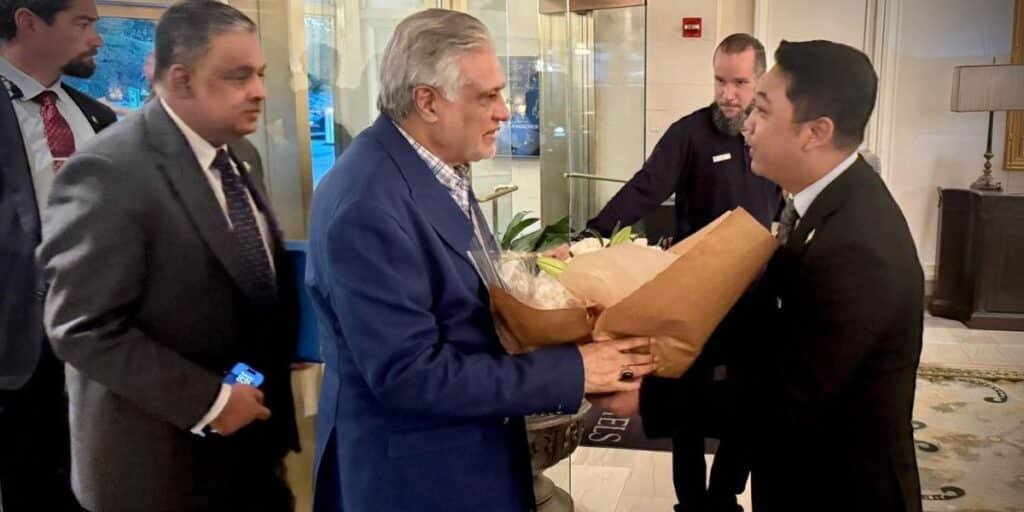Webdesk: Deputy Prime Minister and Foreign Minister Senator Ishaq Dar has arrived in the United States on an official visit. Upon his arrival in Washington, DC, he was received by Pakistan’s Ambassador Rizwan Saeed Sheikh and senior officials of the Embassy.
According to the Foreign Office, Foreign Minister Ishaq Dar is scheduled to meet US Secretary of State Marco Rubio today at the State Department.
The important meeting will include detailed discussions on various aspects of Pakistan-US relations, with a special focus on bilateral trade, investment opportunities, and strengthening economic cooperation.
In addition, both foreign ministers will exchange views on regional and global issues, especially matters of mutual interest.
During his visit, Ishaq Dar will also deliver a speech at the renowned US think tank, the Atlantic Council. There, he will present Pakistan’s perspective, shed light on the current situation in South Asia, and discuss the future of Pakistan-US relations.
Deputy Prime Minister/Foreign Minister, Senator Mohammad Ishaq Dar @MIshaqDar50, arrived in Washington, D.C., tonight and was received by Ambassador of Pakistan to the US, Rizwan Saeed Sheikh @AmbRizSaeed and senior Embassy officials.
— Ministry of Foreign Affairs – Pakistan (@ForeignOfficePk) July 25, 2025
The Deputy Prime Minister/Foreign Minister… pic.twitter.com/yiT1fXuupa
Previously, Deputy Prime Minister and Foreign Minister Senator Mohammad Ishaq Dar has urged stronger collaboration between the United Nations (UN) and the Organisation of Islamic Cooperation (OIC) to support international peace efforts, protect human dignity, and counter the rising wave of religious hatred across the globe.
Chairing a special session at the UN Security Council, in his role as Council President, Dar made Pakistan’s case during a briefing on “Cooperation between the United Nations and regional and sub-regional organisations in maintaining international peace and security: Organisation of Islamic Cooperation (OIC)”.
He welcomed the Security Council’s agreement on a Presidential Statement aimed at strengthening ties between the UN and the OIC, and said the consensus would boost their joint efforts in conflict-affected regions from Libya to the Sahel.
Calling for unity in addressing global challenges, Dar said religious hatred, especially Islamophobia, is in direct conflict with the UN’s founding values. “Religious hatred is not only morally indefensible, it strikes at the very foundation of the UN Charter,” he said, urging a coordinated response to stem the growing tide of extremism.
Ishaq Dar also praised the good work of the OIC in fostering peace in various parts of the world such as Syria, Yemen, Libya, Afghanistan, and the Sahel. He stated that this organisation still remains instrumental in facilitating humanitarian and political resolutions in those regions.
He also commended the OIC on its constant position on Palestine and its history of defending the people of Jammu and Kashmir. Expressing its strong support to the right to self-determination in both regions, the Deputy Prime Minister once again called for an end to India’s illegal occupation of Kashmir.
Deputy Prime Minister/Foreign Minister, Senator Mohammad Ishaq Dar @MIshaq50, in his capacity as President of the UN Security Council, delivered Pakistan's statement at the Security-Council Briefing on “Cooperation between the United Nations and regional and sub-regional… pic.twitter.com/rcIO7kSiXK
— Ministry of Foreign Affairs – Pakistan (@ForeignOfficePk) July 24, 2025
Dar highlighted that the strength of the OIC lies not only in its large and diverse membership but also in the values it upholds. He described the organisation as a crucial link between international and regional efforts, one that balances political priorities with urgent humanitarian concerns.
He remarked that “the OIC’s legitimacy derives not only from its vast and diverse membership, but from the principled clarity of its mandate, to uphold justice, protect human dignity, respect national sovereignty, independence and territorial integrity of all Member States, and advance solidarity among nations.”
Ishaq Dar stressed that the world today faces serious threats from intolerance and violence driven by ideology. Increased cooperation between the UN and the OIC, he observed, might very well hold the key to achieving long-lasting peace and tackling these challenges together.
Read more: ECP notifies KP senators for general, technocrat, women’s seats





